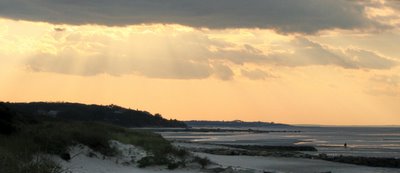“I used to be uncommonly terrified with thunder, and to be struck with terror when I saw a thunder storm rising; but now, on the contrary, it rejoiced me. I felt God, so to speak, at the first appearance of a thunder storm; and used to take the opportunity, at such times, to fix myself in order to view the clouds, and see the lightnings play, and hear the majestic and awful voice of God's thunder, which oftentimes was exceedingly entertaining, leading me to sweet contemplations of my great and glorious God.”
“I am not ashamed to own that I believe that the whole universe, heaven and earth, air and seas, and the divine constitution and history of the Holy Scriptures, be full of images of divine things, as full as a language is of words.”
For Jonathan Edwards, God’s end in creation is the communication of Himself and His glory to the understanding and will of His creatures. Edwards argues that all processes, inhabitants, and histories in the natural world directly correspond to unseen spiritual realities. Unlike the Romantics of the nineteenth-century, he does not embrace anything like Coleridge’s “intuition” or Emerson’s “Over Soul.” He does not appeal to mankind's natural ability to tap into spiritual forces as means for self-realization (as is blatantly popularized by Dr. Wayne Dyer in his new book, Inspiration, www.hayhouse.com/details.php?ref=89&id=2701).
Edwards argues that God is transcendent and immanent. General revelation is not equivalent to special revelation. It does not communicate the gospel or the way of salvation. But it does leave unbelievers without excuse, and it deeply enriches and moves the affections of those who are converted to Christ. Edwards’ view of general revelation, or what he called “images and shadows of divine things,” is distinctly unsentimental. For Edwards, created reality is full of bittersweet contrasts.
In my opinion, Edwards does at times allow his creative imagination to get the best of him. But his God-centered, biblical view of creation offers a welcome corrective to the currently stylish versions of panentheism (all is in God) and pantheism (all is God). Here are some examples from Edwards' "Images of the Divine Things" in Typological Writings (New Haven: Yale, 1993):
Edwards argues that God is transcendent and immanent. General revelation is not equivalent to special revelation. It does not communicate the gospel or the way of salvation. But it does leave unbelievers without excuse, and it deeply enriches and moves the affections of those who are converted to Christ. Edwards’ view of general revelation, or what he called “images and shadows of divine things,” is distinctly unsentimental. For Edwards, created reality is full of bittersweet contrasts.
In my opinion, Edwards does at times allow his creative imagination to get the best of him. But his God-centered, biblical view of creation offers a welcome corrective to the currently stylish versions of panentheism (all is in God) and pantheism (all is God). Here are some examples from Edwards' "Images of the Divine Things" in Typological Writings (New Haven: Yale, 1993):
28. "As thunder, and thunder clouds, as they are vulgarly called, have a shadow of the majesty of God, so the blue sky, the green fields and trees, and pleasant flowers have a shadow of the mild attributes of the goodness, grace, and love of God, as well as the beauteous rainbow."
33. "The extreme fierceness and extraordinary power of the heat of lightening is an intimation of the exceeding power and terribleness of the wrath of God."
42. "The gradual progress we make from childhood to manhood is a type of the gradual progress of the saints in grace."
58. "Tis a sign that the beautiful variety of the colors of light was designed as a type of the various beauties and graces of the Spirit of God."
61. "Ravens that with delight feed on the carrion seem to be remarkable types of devils who with delight prey upon the souls of the dead."
64. "Hills and mountains are types of heaven, and often made use of as such in Scripture. These are difficultly ascended. To ascend them, one must go against the natural tendency of the flesh."




No comments:
Post a Comment